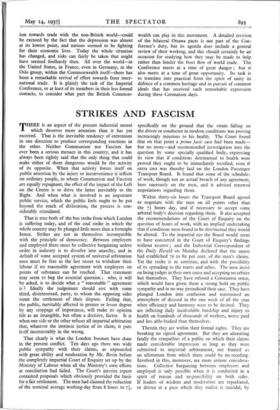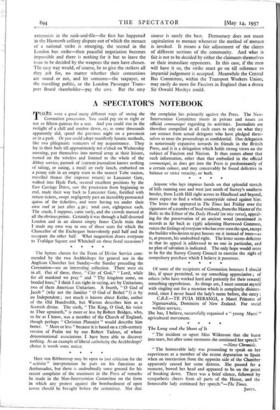STRIKES AND FASCISM
THERE is an aspect of the present industrial unrest which deserves more attention than it has yet received. That is the inevitable tendency of extremism in one direction to produce corresponding reactions in the other. Neither Communism nor Fascism has ever been a serious menace in this country•, and it has always been rightly said that the only thing that could make either of them dangerous would be the activity of its opposite. When that activity forces itself on public attention by the injury or inconvenience it inflicts on ordinary people, to whom Communism and Fascism are equally repugnant, the effect of the impact of the Left on the Centre is to drive the latter inevitably to the Right. And when what is involved is an important public service, which the public feels ought to be put beyond the reach of dislocation, the process is con- siderably stimulated.
That is true both of the bus strike from which London is suffering today, and of the coal strike in which the whole country may be plunged little more than a fortnight hence. Strikes are not in themselves incompatible with the principle of democracy. Between employers and employed there must be collective bargaining unless order in industry• is to dissolve into anarchy, and in default of some accepted system of universal arbitration men must be free in the last resort to withdraw their labour if no reasonable agreement with employers on points of substance can be reached. That statement may seem to beg the essential question ; who, it will be asked, is to decide what a " reasonable " agreement is ? Ideally the judgement should rest with some third, disinterested, party, to whom the opposing sides remit the settlement of their dispute. Failing that, the public, inevitably affected in greater or lesser degree by any stoppage of importance, will make its opinion felt as an intangible, but often a decisive, factor. It is when one side or the other refuses all impartial arbitration that, whatever the intrinsic justice of its claim, it puts itself incontestably in the wrong.
That clearly is what the London busmen have done in the present conflict. Ten days ago there was wide public sympathy with their claims, as expounded with great ability and moderation by Mr. Bevin before the completely impartial Court of Enquiry set up by the Ministry of Labour when all the Ministry's own efforts at conciliation had failed. The Court's interim report contained proposals which obviously provided the basis for a fair settlement. The men had claimed the reduction of the nominal average working-day from 8 hours to 7i, specifically on the ground that the strain falling on the driver or conductor in modern conditions was proving increasingly injurious to his health. The Court found that on that point a prima facie case had been made— but no more—and recommended investigation into the question by some specially qualified body, expressing its view that if conditions detrimental to health were proved they ought to be immediately rectified, even if extra cost was thereby laid on the London Passenger Transport Board. It found that some of the schedule.; of work, though not an actual breach of any agreement, bore onerously on the men, and it advised renewed negotiations regarding them.
Within thirty-six hours the Transport Board agreed to negotiate with the men on all points other than the 7Lt hours day, and if necessary to accept some arbitral body's decision regarding them. It also accepted the recommendations of the Court of Enquiry on the question of hours of work, with an implied undertaking that if conditions were found to be detrimental they would be altered. To the impartial eye the Board would seem to have concurred in the Court of Enquiry's findings without reserve ; and the Industrial Correspondent of the Daily Herald on Monday declared that the union had established 70 to 8o per cent. of the men's claims. Yet the strike is to continue, and with the possibility of its spreading to the trams and tubes. The men insist on being judges in their own cause and accepting no arbiter but themselves. They have refused a Coronation truce, which would have given them a strong hold on public sympathy and in no way prejudiced their case. They have plunged London into confusion and maintained an atmosphere of discord in the one week of all the year when efficiency and harmony were to be desired. They are inflicting daily incalculable hardship and injury to health on hundreds of thousands of workers, worse paid and less able-bodied than themselves.
Therein they are within their formal rights. They are breaking no signed agreement. But they are alienating fatally the sympathies of a public on which their claims made considerable impression so long as they were submitted to impartial arbitrament, not framed as an ultimatum from which there could be no receding. Involved in this, moreover, are more serious considera- tions. Collective bargaining between employers and employed is only possible when it is conducted in a spirit of reason and responsibility on both sides. If leaders of wisdom and moderation are repudiated, or driven at a pace which they realise is suicidal, by extremists in the rank-and-file—the first has happened in the Harworth colliery dispute out of which the menace of a national strike is emerging, the second in the London bus strike—then peaceful negotiation becomes impossible and there is nothing for it but to leave the issue to be decided by the weapons the men have chosen. The easy way would, of course, be to give the strikers all they ask for, no matter whether their contentions are sound or not, and let someone—the taxpayer, or the travelling public, or the London Passenger Trans- port Board shareholder—pay the cost. But the easy course is rarely the best. Democracy does not mean capitulation to menace whenever the method of menace is invoked. It means a fair adjustment of the claims of different sections of the community. And what is fair is not to be decided by either the claimants themselves or their immediate opponents. In this case, if the men will have it so, the strike must go on till reference to impartial judgement is accepted. Meanwhile the Central Bus Committee, within the Transport Workers Union, may easily do more for Fascism in England than a dozen Sir Oswald Mosleys could.















































 Previous page
Previous page